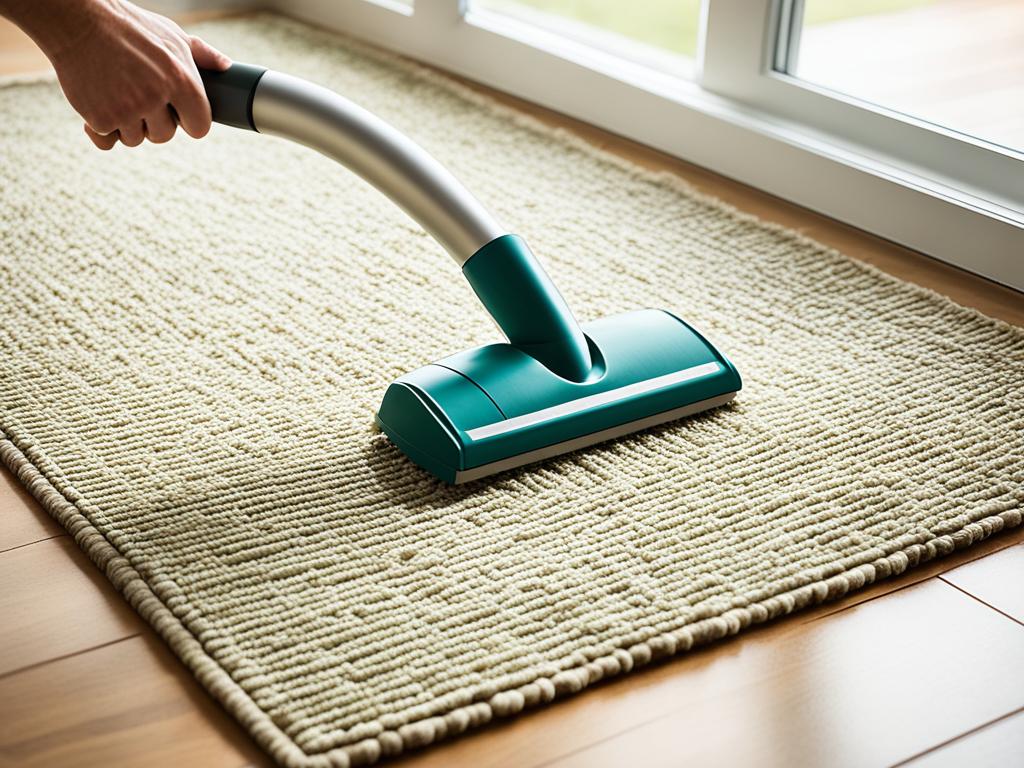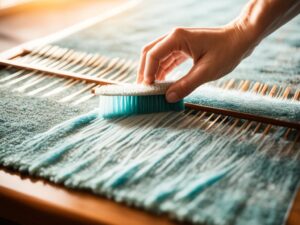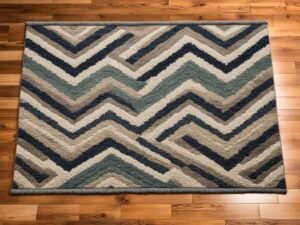Welcome to our comprehensive guide on how to clean a seagrass rug. Seagrass rugs are not only beautiful and durable but also eco-friendly, making them a popular choice for many homeowners. However, they require specific care to ensure their longevity and keep them looking their best. In this article, we will provide you with easy steps and handy tips on cleaning and maintaining your seagrass rug.
Key Takeaways:
- Immediately remove spills on seagrass rugs by blotting with a clean, white towel.
- For solid spills, scrape up the solids with a dull knife or nail file before blotting.
- Dab red wine or tomato sauce spills with a white cloth dampened with club soda.
- Regular vacuuming is essential to prevent soil build-up.
- Avoid steam cleaning or wet shampooing and opt for dry cleaning.
Spot Cleaning Seagrass Rugs
When it comes to maintaining the cleanliness and appearance of your seagrass rug, spot cleaning is a crucial step. 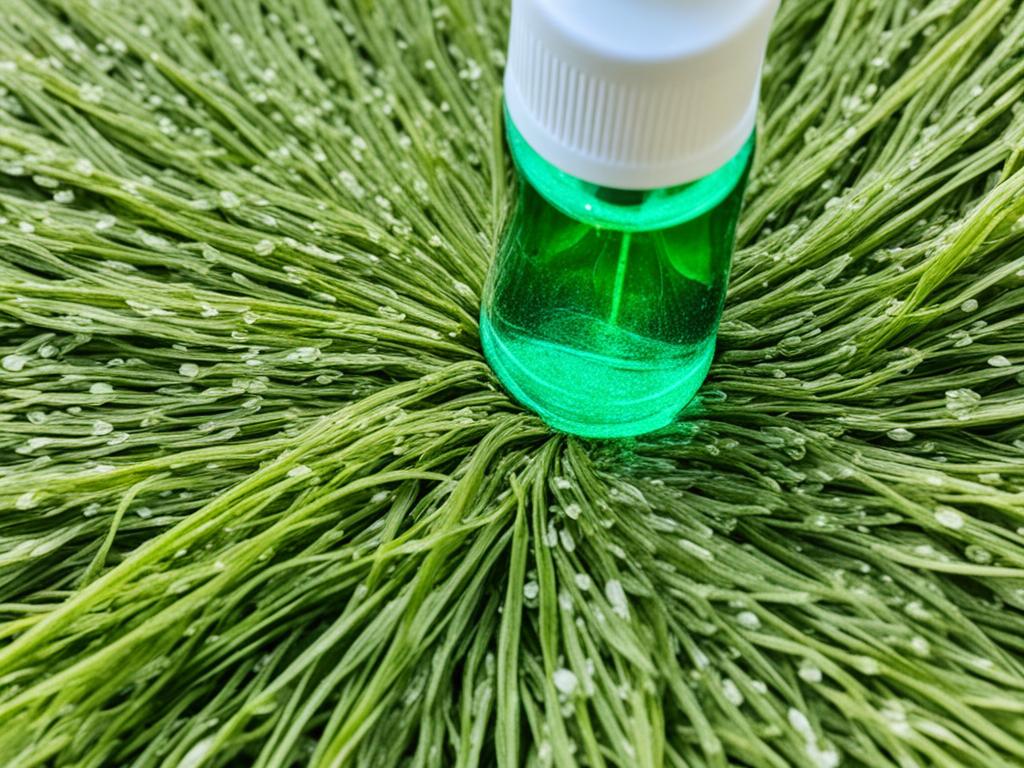 Place the rug in a well-lit area to easily identify any spills or stains that require immediate attention.
Place the rug in a well-lit area to easily identify any spills or stains that require immediate attention.
Follow these simple steps for effective spot cleaning:
- Blotting: For liquid spills, such as juice or coffee, quickly blot the area with a clean, white paper or cloth towel. Start from the outside of the spill and work your way towards the center to prevent the stain from spreading. Avoid rubbing the spill, as it may push the liquid further into the fibers.
- Scraping: For solid spills, like food or mud, carefully scrape up the solids with a dull knife or nail file. Be gentle to avoid damaging the rug fibers. Once the solids have been removed, proceed to blot the area as mentioned earlier.
- Special Stains: Some stains, such as red wine or tomato sauce, require extra attention. Dab the stained area with a white cloth dampened with club soda, working from the outer edges towards the center. Club soda helps to break down the stain and lift it from the fibers. If the stain persists, clean the area with a cloth dampened with mild soap or a seagrass rug cleaner. Always test the cleaning solution on a small, inconspicuous area of the rug before applying it to the stain.
- Drying: After spot cleaning, it’s important to dry the rug thoroughly to prevent mold or mildew growth. Gently blot the cleaned area with a dry towel to absorb any excess moisture. Open windows or use fans to promote air circulation and expedite the drying process.
Remember, prompt action is key when it comes to spot cleaning seagrass rugs. The sooner you address spills and stains, the better chance you have of removing them completely. Regular maintenance, including vacuuming and immediate spot cleaning, will help keep your seagrass rug looking its best for years to come.
Pet Accident Cleanup
Accidents happen, especially when you have pets. If your beloved furry friend has had an accident on your seagrass rug, it’s important to address it promptly to prevent any lasting damage. Here are some helpful seagrass rug cleaning tips for tackling pet accidents:
Cleaning Urine Accidents
When dealing with a urine accident, the first step is to blot up as much of the spot as possible. Use paper towels or a white cloth and work from the outside towards the center. Avoid rubbing the stain, as this can push it deeper into the fibers.
Once you’ve blotted up the urine, it’s important to neutralize the odor. Create a solution by mixing 1/4 cup of white vinegar with 1/4 cup of water. Dampen a towel with the solution and gently dab the area. Vinegar is effective at neutralizing urine odors and can help eliminate any lingering smells.
After treating the area with vinegar, follow the spot cleaning procedures mentioned earlier to remove any remaining stain. This may involve using a cloth dampened with mild soap or a seagrass rug cleaner. Be sure to dry the rug thoroughly after cleaning to prevent any mold or mildew growth.
Dealing with Feces or Vomit
If your pet has had an accident involving feces or vomit, start by carefully removing any excess material. Use a plastic bag or paper towel to scrape up the solids, working from the outer edges towards the center.
Once the solids have been removed, follow the spot cleaning procedures mentioned earlier to treat the remaining stain. Depending on the severity of the stain, you may need to use a cloth dampened with mild soap or a seagrass rug cleaner. Make sure to thoroughly dry the rug after cleaning.
Regular Maintenance and Professional Cleaning
Regular vacuuming is essential for maintaining the cleanliness and appearance of seagrass rugs, especially in homes with pets. Vacuuming helps to remove pet hair, dander, and any loose dirt or debris. Use a vacuum cleaner with a strong suction power and avoid using a beater bar, as it can damage the rug.
In addition to regular vacuuming, it’s recommended to have your seagrass rug professionally cleaned every 1-2 years. Professional cleaning helps to remove deep-seated dirt and stains that may not be easily tackled at home. It also helps to refresh the rug and prolong its lifespan.
By following these seagrass rug cleaning tips and maintaining a regular cleaning routine, you can keep your rug looking fresh and free from pet-related accidents and stains.
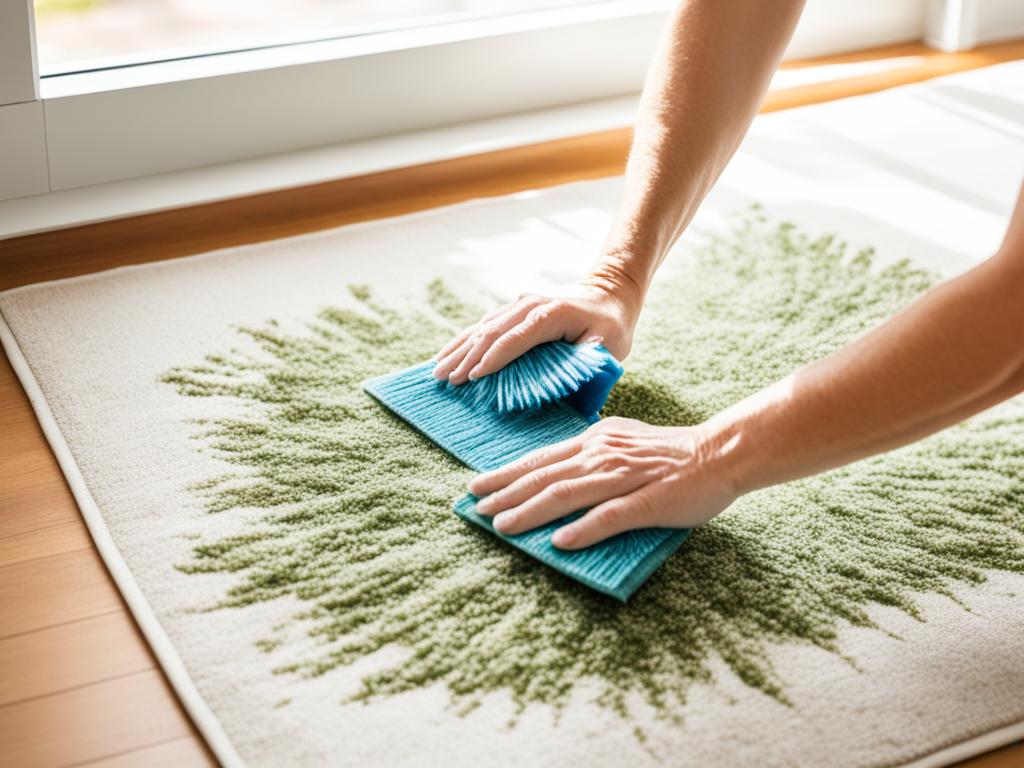
Overall Cleaning and Maintenance
Proper cleaning and maintenance are essential for keeping your seagrass rug looking its best and ensuring its longevity. By following these seagrass rug care instructions and maintenance tips, you can preserve the natural beauty of your rug for years to come.
Control Moisture Levels
When cleaning seagrass rugs, it is crucial to avoid excessive moisture. Steer clear of steam cleaning or wet shampooing as these methods can cause water saturation and damage the natural fibers. Instead, opt for a dry cleaning process using products specifically designed for seagrass rugs. The Host Dry Cleaner Kit or a professional dry cleaning service are excellent options.
Vacuum Regularly
To prevent soil build-up and prolong the life of your seagrass rug, regular vacuuming is key. Use a strong suction vacuum without a beater bar to remove dirt and debris without harming the rug’s fibers. Take special care when vacuuming bound rugs to avoid damaging the binding.
Maintain Dryness
In dry climates or low humidity areas, lightly misting your seagrass rug with water can help strengthen the natural fibers. However, it is crucial not to over-saturate the rug. Ensure that the rug is thoroughly dry before applying any moisture to avoid potential damage.
Routine Maintenance of Woven Fabric Borders
For seagrass rugs with woven fabric borders, routine maintenance is essential. Vacuum the edge finish regularly to remove any dirt or dust. In the case of spot cleaning, use a mild, neutral cleaning solution suitable for the specific fabric type.
Consider a Protective Spray
To decrease absorbency and increase stain resistance, consider treating your seagrass rug with a protective spray. Products like the Sisal Life Protector are designed to provide an extra layer of protection for your rug.
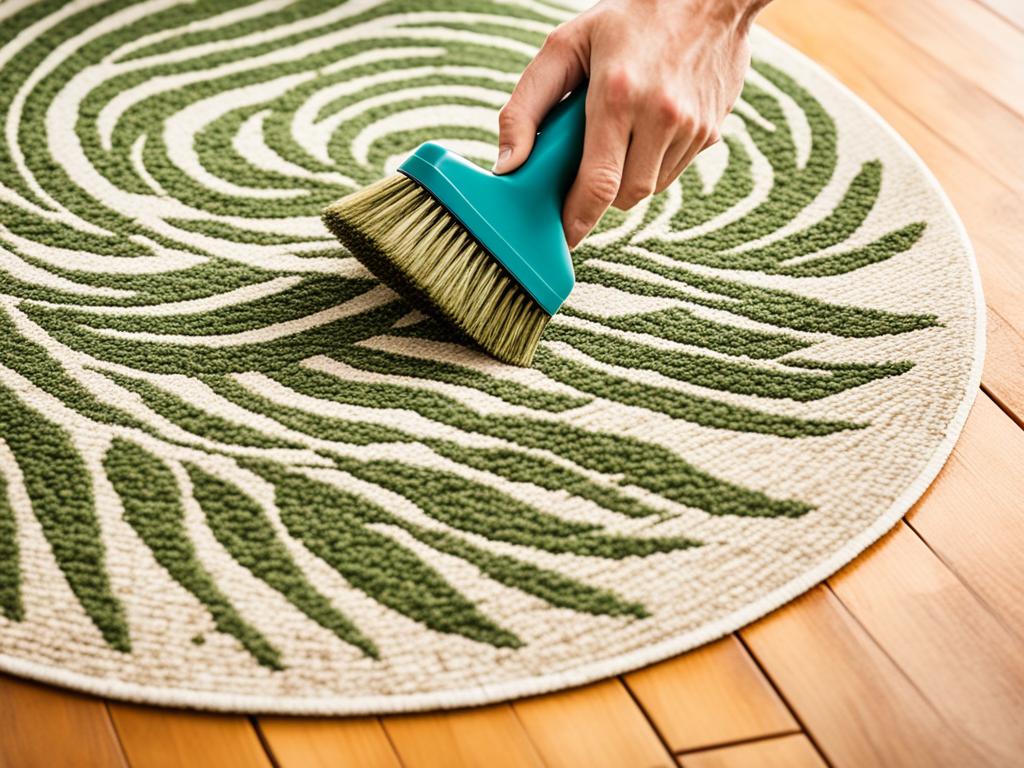
Conclusion
Proper care and maintenance are crucial for preserving the cleanliness and longevity of your seagrass rug. By following a few simple steps, you can ensure that your rug remains in top condition for years to come.
First and foremost, promptly address any spills or accidents by spot cleaning the affected area. Blot liquid spills and scrape solid ones, then use mild soap or a specialized seagrass rug cleaner to remove stains.
In addition, regular vacuuming is essential to prevent the buildup of dirt and debris. Be sure to use a strong suction vacuum without a beater bar to avoid damaging the rug’s natural fibers.
While professional cleaning is recommended every 1-2 years, it is equally important to take preventive measures. Implementing a “no shoes in the house” policy and using walk-off mats can significantly reduce the amount of dirt and debris that enters your home, thereby minimizing the need for extensive cleaning.
By following these care instructions and investing in professional seagrass rug cleaning when needed, you can keep your rug looking clean and fresh, maintaining its natural beauty and extending its lifespan.
